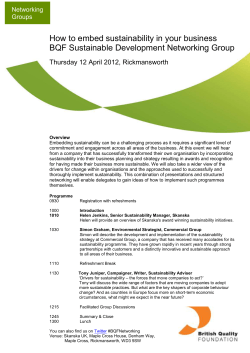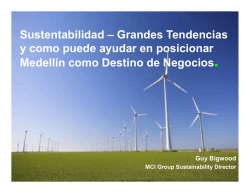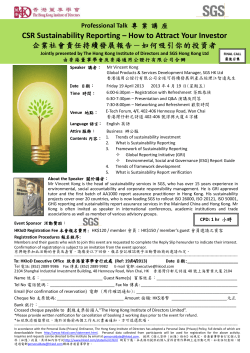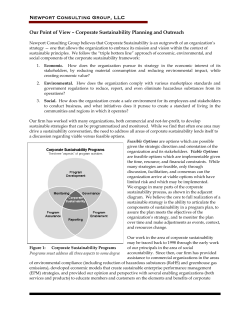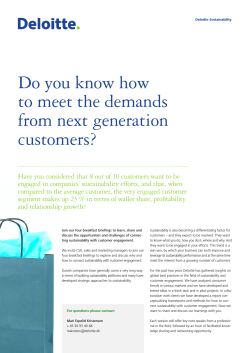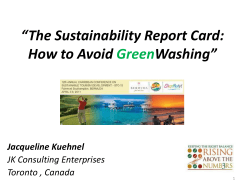
What is BS 8901? Millennium Stadium Supply Chain Partnership December 2010
Millennium Stadium Supply Chain Partnership December 2010 What is BS 8901? • • • BS 8901:2009 Specification for a sustainability management system for events • • • • • Application Why is it Different to ISO14001? From local craft to London Olympics • Tier One - Event Owner (the commissioner) • Tier Two - Event Organiser (the deliverer) • Tier 3 – Suppliers to the Event (the providers – catering, sound, display etc) Main differences between ISO 14001 and BS 8901 Follows the Plan-Do-Check-Act • Phase 1 – Planning Define the Policy, Stakeholders, Issues, KEPIs Phase 2 – Implementation Responsibilities, staff training, resources, management of the supply chain Phase 3 – Check and Review Monitor, measure, evaluate and take action to improve • There are three aspects, one of which is environmental, the other two are economic and social sustainability If an event is to be economically, socially, and environmentally sustainable, the vendors supplying the event must deliver their products or services in an economically, socially, and environmentally sustainable manner. It’s good if you have an effective method of recycling used paper, but it’s much better if the paper you buy, use, and recycle comes from a supplier that uses recycled paper or paper from pulp harvested from carefully managed forests, rather than from a supplier that promotes rain forest clearances. Enviromentor Ltd ISO 14001 BS 8901 Generic Business Integral process Social aspects - not primary focus Supply chain – not primary focus Life Cycle and generic impact Objective auditing (KPI’s) PDCA (Plan Do Check Act) Clauses 4.2 – 4.6 Refers to ‘Aspects’ and Impacts Events Industry Specific Integral process Social aspects - primary focus Supply chain an essential criterion Life Cycle in terms of the event Objective auditing (KPI’s) PDCA (Plan Do Check Act) Clauses 3.2 – 3.9 Refers to ‘Issues’ and Impacts What’s involved? The Basic Process of BS 8901 • New British Standard - Sustainability Management System for Events. Helps events industry conduct business operations in a more sustainable manner Developed specifically for, event clients; event organisers/management; venues; and related supply chains Covers economic activity, environmentally responsibility and social progress Can be certified against the management system to manage their event-oriented activities, products and services and can be against one event only. The event is the ‘output’ of the system. The standard is applicable to all events, the full life-cycle of the event and the supply chain. Every choice from venue, travel arrangements, catering to the delegate packs should be as responsible as possible London Organising Committee of the Olympic Games, are using BS, to encourage suppliers to have comparable management systems for sustainability. • • Setting your scope Identifying issues Environmental – climate, air, water, land use, biodiversity, waste etc. • • • • • Procurement, Product stewardship Social and economic - Health, safety and comfort, security, equal opportunity and diversity, Community, local employment and skills, amenity, viability and supply chain management Setting achievable targets Developing sustainability policy Engaging with stakeholders Recording/measuring results – benchmarking? Reviewing & updating process 1 Millennium Stadium Confused? – An Example Objective 1: Measure and reduce environmental impacts from Oracle Open World for: energy, water, and waste. Key Performance Indicators/Targets: • Total material reductions and diversion through purchasing, composting, recycling • Percentage of waste diversion • Facility energy use • Travel miles/Fuel use • Facility water use • Communications - reduction in onsite paper and improved signage reuse In addition, vendor responsibility for sustainability is clearly outlined in event request for proposals and contracts. This includes accountability by vendors who may not be part of the Team. Contract guidelines include specific sustainability actions and measurements for all of the following: Accommodations, Meeting Venue, Caterer, General Services Contractor, Transportation, Audio-Visual & Production, Meeting Management & Logistics, Communications & Marketing, On-site Office & Signage Supply Chain Partnership December 2010 Who Already Has BS8901? • Currently 30 companies certified with BS8901 and most are conference centres, for example the Earls Court London but others include: • One Wimpole Street, the events and conferencing arm of the Royal Society of Medicine, was the first venue in the country to be issued with a certificate for BS 8901 on 20 February 2009 • The Weymouth and Portland National Sailing Academy (WPNSA), Olympics’ sailing events • Radisson Blu Hotel, Krakow, first hotel worldwide to receive BS8901 Catering firms offering lower carbon menus, new tools to monitor events, venues providing 100% compostable service ware and achieving 100% waste diversion rates from landfill, event organisers running events with zero handouts and giveaways, conferences being powered by solar energy, free concert tickets being provided to those who support community projects. It is the innovators that will gain the competitive edge as clients, such as the London 2012 Olympics, start to demand more sustainable solutions to their events. What Next ISO 20121 • • • • • • ISO20121: International Standard for event industry currently being developed 30 countries involved Expected in 2012 Will lead sustainable management practices Global framework to encourage sustainability ISO 20121 is expected to be finalised in 2012 to coincide with the London Olympics. All international standards bodies have been invited to be part of the development process and those that choose to be involved will build on BS 8901 to create ISO 20121 Enviromentor Ltd Questions 2
© Copyright 2025

